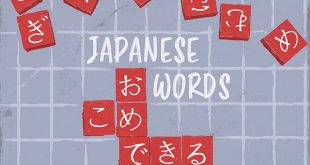1000 Most Common Japanese Words – Part 7
601. なるほど (naruhodo) : I see, really
602. つまり (tsumari) : in short, that is to say
603. そのまま (sonomama) : as it is, just like that
604. はっきり (hakkiri) : clearly
605. 大変 (taihen) : awful, hard
606. 簡単 (kantan) : simple, easy
607. 似ている (niteiru) : look like, resemble
608. 驚く (odoroku) : be surprised, be startled
609. 嫌 (iya/ kira-i) : dislike (situational)
610. 喧嘩 (kenka) : fight, argument
611. 遅れる (okureru) : be late
612. にんじん (ninjin) : carrot
613. ジャガイモ (jagaimo) : potato
614. ナス (nasu) : eggplant
615. やかん (yakan) : kettle
616. 話し合う (hanashiau) : discuss, talk over
617. 残す (nokosu) : leave, leave undone
618. ごちそうする (gochisousuru) : treat, host (a meal)
619. 合う (au) : fit, match
620. 当たる (ataru) : (go straight and) hit, strike
621. 集まる (atsumaru) : gather, be collected
622. 場所 (basho) : place, space
623. 海 (umi) : sea, ocean
624. 少年 (shounen) : boy (between 7 and 18 years old)
625. 孫 (mago) : grandchild
626. 生徒 (seito) : pupil, student
627. 高校 (koukou) : high school (for short)
628. 年上 (toshiue) : older, senior
629. 卒業 (sotsugyou) : graduation
630. 運動 (undou) : movement, exercise
631. 選手 (senshu) : athlete, (sports) player
632. 映画 (eiga) : movie
633. 英語 (eigo) : English
634. 手紙 (tegami) : letter
635. 動物 (doubutsu) : animal
636. 音 (oto) : sound, noise
637. 海外 (kaigai) : overseas, abroad
638. 外国人 (gaikokujin) : foreigner
639. 帰国 (kikoku) : return to one’s country
640. 彼ら (karera) : they
641. 機械 (kikai) : machine
642. 基本 (kihon) : basics
643. 今度 (kondo) : this time, next time
644. 最後 (saigo) : last
645. 最初 (saisho) : first, outset
646. 準備 (junbi) : preparation, arrangement
647. 進む (susumu) : advance, move forward
648. 直接 (chokusetsu) : directly
649. 特に (tokuni) : specially, particularly
650. 届く (todoku) : reach, be received
651. なぜ (naze) : why
652. 並ぶ (narabu) : line up, be parallel
653. 運ぶ (hakobu) : carry, transport
654. 直す (naosu) : repair, fix
655. 反対 (hantai) : oppose, object
656. 場合 (baai) : situation, case
657. 詳しい (kuwashii) : detailed
658. いたずら (itazura) : mischief, prank
659. お祝い (oiwai) : celebrate
660. くし (kushi) : comb
661. こぼれる (koboreru) : spill, overflow
662. 伝える (tsutaeru) : convey, transmit
663. 膝 (hiza) : knee
664. 肘 (hiji) : elbow
665. 枕 (makura) : pillow
666. 建物 (tatemono) : building, structure
667. 道路 (douro) : road
668. 四つ角 (yotsukado) : intersection
669. 曲がり角 (magarikado) : corner (to turn)
670. 警察 (keisatsu) : police
671. 空気 (kuuki) : air, atmosphere
672. スポーツ (supo-tsu) : sport
673. チャンス (chansu) : chance
674. クリーニング (kuri-ningu) : dry cleaning
675. サービス (sa-bisu) : service, on the house
676. グループ (guru-pu) : group
677. 自宅 (jitaku) : one’s house, one’s home
678. 家庭 (katei) : home, family
679. 期間 (kikan) : term, period
680. 年度 (nendo) : year, school year
681. 経験 (keiken) : experience, knowledge
682. 安全 (anzen) : safety, security
683. 危険 (kiken) : danger, dangerous
684. 注意 (chuui) : attention, care
685. 成功 (seikou) : success
686. 努力 (doryoku) : endeavor, effort
687. 説明 (setsumei) : explanation, description
688. 地震 (jishin) : earthquake
689. 手術 (shujutsu) : surgical operation
690. 火傷 (yakedo) : burn
691. 課題 (kadai) : task, assignment
692. 子 (ko) : young child, kid
693. 確認 (kakunin) : confirmation
694. 実際 (jissai) : reality, actual state
695. 国際 (kokusai) : international (used in compound nouns)
696. 会議 (kaigi) : conference, meeting
697. 提案 (teian) : proposition, proposal
698. 事務所 (jimusho) : office, one’s place of business
699. 教授 (kyouju) : professor
700. 世紀 (seiki) : century
Related Post:
1000 Most Common Japanese Words – Part 6
1000 Most Common Japanese Words – Part 8
 Learn Japanese Learn Japanese
Learn Japanese Learn Japanese


